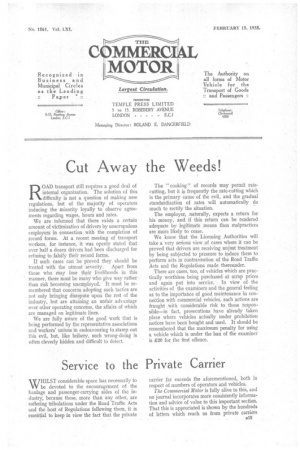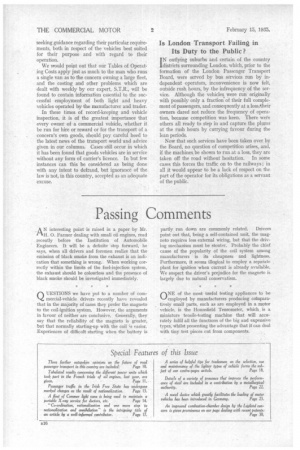Service to the Private Carrier v 11 THILST considerable space has necessarily
Page 31

Page 32

If you've noticed an error in this article please click here to report it so we can fix it.
to ` be devoted to the encouragement of the haulage and passenger-carrying sides of the industry, because these, more than any other, are suffering tribulations under the Road Traffic Acts and the host of Regulations following them, it is essential to keep in view the fact that the private carrier far exceeds the aforementioned, both in respect of numbers of operators and vehicles. The Commercial Motor is fully alive to this, and no journal incorporates more consistently information and advice of value to this important section. That this is appreciated is shown by the hundreds of letters which reach us from private carriers seeking guidance regarding their particular requirements, both in respect of the vehicles best suited for their purpose and with regard to their operation.
We would point out that our Tables of Operating Costs apply just as much to the man who runs a single van as to the concern owning a large fleet, and the costing and other problems which are dealt with weekly by our expert, S.T.R., will be found to contain information essential to the successful employment of both light and heavy vehicles operated by the manufacturer and trader.
In these times of record-keeping and vehicle inspection, it is of the greatest importance that every owner of a commercial vehicle, whether it be run for hire or reward or for the transport of a concern's own goods, should pay careful heed to the latest news of the transport world and advice given in our columns. Cases still occur in which it has been found that goods vehicles are in service without any form of carrier's licence. In but few instances can this be considered as being done with any intent to defraud, but ignorance of the law is not, in this country, accepted as an adequate excuse.
Is London Transport Failing in Its Duty to the Public ?
I N outlying suburbs and certain of the country districts surrounding London, which, prior to the formation of the London Passenger Transport Board, were served by bus services run by independent operators, inconvenience is now felt, outside rush hours, by the infrequency of the service. Although the vehicles were run originally with possibly only a fraction of their full complement of passengers, and consequently at a loss ,'their owners dared not reduce the frequency of operation, because competition was keen. There were others all ready to step in and capture the plums at the rush hours by currying favour during the lean periods.
Now that such services have been taken over by the Board, no question of competition arises, and, if the machines be shown to run at a loss, they are taken off the road without hesitation. In some cases this forces the traffic on to the railways ; in all it would appear to be a lack of respect on the part of the operator for its obligations as a servant of the public.




























































































